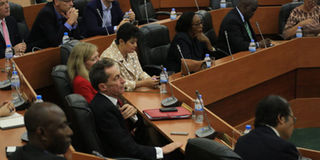Rwanda government meets envoys over polls

Envoys attend to a meeting in the Senate (Upper chamber) at Parliamentary buildings in Kigali. Courtesy Photo
A select team of Rwandan senators and Members of Parliament have met with foreign diplomats in Rwanda Capital Kigali in a charm offensive to explain issues surrounding the referendum on constitutional amendments due tomorrow, December 18.
The meeting held in the Senate (Upper chamber) at Parliamentary buildings in Kigali was attended by 17 envoys. It was chaired by Senator Mike Rugema in the company of fellow senator, Tito Rutaremara and MPs Juliane Kantengwa and Francois Byaberamwanzi.
The ambassadors were concerned about what they termed as “the rush” and “speed at which the referendum was happening asking if enough time had been given for civic education and space for opposition to campaign.
“You have said that even the text of the amendments has not been published. How are the Rwandan people supposed to know what they are voting?” US Ambassador Erica J. Barks-Ruggles asked.
Her concerns were re-echoed by the Netherlands Ambassador to Rwanda, Ms Leoni Cuelenaere and the EU head of delegation to Rwanda, Ambassador Michael Ryan who said that the space between the announcement of the date for referendum and its actual holding was limited.
In response, Senator Rutaremara said the process leading to the amendments of the constitution to suspend term limits for President Paul Kagame to stand again started in 2010 and only gained momentum at the beginning of this year. He said that information about the amendments has been published severally on the website of both chambers of parliament, explained on social media and radio and television shows.
“Unless you tell us that we write a nice book with a nice cover,” the Senator Rutaremara mused. He said the debate on article 101 that prescribed the 7-year term limits for president has been on for three years.
On his part, Senator Rugema noted that while 37 of the 165 articles in the Constitution were amended, it was only article 101 on term limits that demanded for a referendum.
He pointed out that article 193 of the old Constitution demanded that when the revision of the constitution concerns the term of the president or a change in the governance system, there has to be a referendum.
“The revision of the constitution was in secret. It was in public, with the media present. It couldn’t have taken a year to explain one article to the people of Rwanda,” he said.
On whether the opposition had been given space to campaign, MP Kantengwa said that the MP who were pro the amendments felt obliged to listen to their constituents and even report back in consultative meetings. “It shouldn’t be our responsibility to ask them (opposition) why they didn’t go back to their members, if they have them,” she noted. The Green Party petition the Supreme Court to block the referendum but its petition was unsuccessful.
Asked the meeting what the EU would do now that Rwanda has gone on with the referendum, the EU envoy said they would respect the decision by Rwandans.
“Our opposition should be understood in context,” he said. “They are issues we were opposed to and pointed out,” he said. “If we were all perfect, we would be in paradise,” he added.



